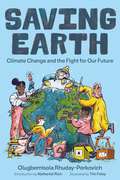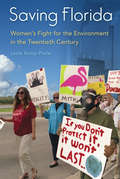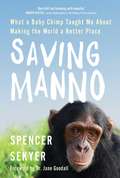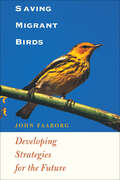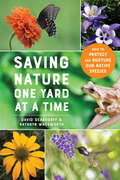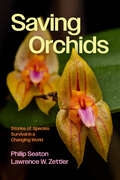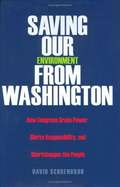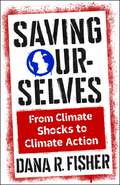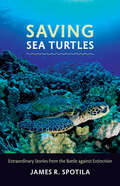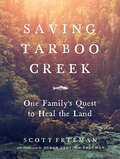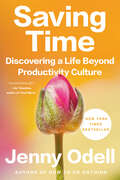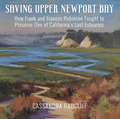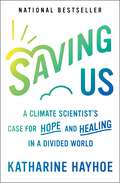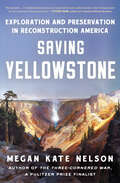- Table View
- List View
Saving Earth: Climate Change and the Fight for Our Future
by Olugbemisola Rhuday-PerkovichA timely and inspiring nonfiction guide for middle grade readers about the history of our fight against climate change, and how young people today are rising to action. Inspired by Nathaniel Rich’s Losing Earth: A Recent History, the acclaimed book that grew out of an August 2018 issue of the New York Times Magazine solely dedicated to it, Saving Earth tells the human story of the climate change conversation from the recent past into the present day. It wrestles with the long shadow of our failures, what might be ahead for today’s generation, and crucial questions of how we understand the world we live in—and how we can work together to change the outlook for the better. Written by acclaimed author Olugbemisola Rhuday-Perkovich and enlivened with illustrations from Tim Foley, and filled with the voices of climate activists from the past and present, this book is both a call to action and a riveting dramatic history.A Junior Library Guild Selection
Saving Endangered Species: Lessons in Wildlife Conservation from Indianapolis Prize Winners
by Robert W. ShumakerThe amazing true stories of the greatest wildlife champions of our time.Wildlife conservation is at a critical juncture. While large, charismatic mammals may be the first animals that come to mind—the mere 3,000 wild tigers still in existence, the giraffes declared endangered for the first time just last year—it is not only these magnificent keystone species disappearing. A full third of all studied birds, reptiles, and mammals have suffered devastating population losses, and a third of all insects are now endangered, including crucial pollinators that sustain worldwide food supply. Over 15,000 animal species are now considered to be threatened with extinction. There are, however, bright spots that provide optimism—many of them due to the efforts of a small group of scientists and activists. In Saving Endangered Species, Robert W. Shumaker brings together ten conservation heroes, seven of them winners of the Indianapolis Prize, three of them recipients of the Jane Alexander Global Wildlife Ambassador Award. With moving immediacy, each wildlife defender offers their unique perspective on the state of wildlife conservation and the future of the natural world. Bringing to life their work in the field, each contributor also explains key concepts in wildlife conservation, reveals why they are important, and discusses what kinds of work can be done to address biodiversity loss.Contributors sharing their stories in their own words include• George Schaller, one of the founding fathers of wildlife conservation, who conducted the field work that resulted in the establishment of the world's largest wildlife preserve, the Arctic National Wildlife Refuge• Iain Douglas-Hamilton, who is widely credited with developing the metrics and methods that stemmed the tide of elephant poaching for ivory in Africa• Steven Amstrup, who discovered the disturbing truth that the sea ice polar bears rely on for traveling, hunting, and raising their young was disappearing • Russell Mittermeier, who has discovered over 20 new animal species, conducted field work in more than 30 countries around the globe, and authored 15 books on biodiversity• Harrison Ford, Academy Award–winning actor, who has been a passionate wildlife advocate and board member of Conservation International for over 25 years• Sigourney Weaver, three-time Academy Award nominee, whose work with the Dian Fossey Gorilla Fund has helped save thousands of gorillas in Rwanda and CongoThis unique book aims to win new recruits, inspire biologists and conservationists already in the field, and illustrate the profession's fundamental scientific tenets through wildlife champions' own exciting narratives. Covering issues from reproduction and prey-predator relationships to population dynamics and community engagement, Saving Endangered Species also addresses such thorny topics as overhunting, retaliatory killing by farmers, development-driven habitat loss, and the illegal wildlife trade. By encompassing a broad spectrum of subjects, this volume ultimately gives readers a first-person look into what it takes to dedicate oneself to the crucial field of wildlife conservation.Contributors: Jane Alexander, Steven C. Amstrup, George Archibald, Michael I. Crowther, Iain Douglas-Hamilton, Harrison Ford, Carl Jones, Russell Mittermeier, George B. Schaller, Robert W. Shumaker, Sigourney Weaver, Patricia Chapple Wright
Saving Florida: Women's Fight for the Environment in the Twentieth Century
by Leslie Kemp PooleIn Saving Florida, Leslie Kemp Poole casts new light on the women at the forefront of Florida’s environmental movement. From creating parks to protesting air pollution, fighting dredge-and-fill operations, and exposing the health dangers of pesticides, these women caused unprecedented changes in how the Sunshine State values its many and marvelous natural resources.At the beginning of the twentieth century women didn’t have the vote, but by the end of the century they were founding issue-specific groups, like Friends of the Everglades, and running state and federal agencies, including the U.S. Environmental Protection Agency. They set the foundation for the next century’s environmental agenda, which came to include the idea of sustainable development, which meshes ecology and economy to enhance energy efficiency and the function of natural systems.This is an indispensable history that not only underscores the importance of women in the environmental movement but also shows how as a collective force they forever altered how others saw women’s roles in society.
Saving Manno: What a Baby Chimp Taught Me About Making the World a Better Place
by Spencer SekyerAn inspiring and uplifting memoir about one small-town teacher’s eye-opening travels around the world and his relentless efforts to rescue a chimp in danger.As a child, Spencer Sekyer’s world was a simple one. He grew up in a small town, where many of his days were spent hunting in the woods and pursuing his dream of becoming a professional athlete. But when his athletic career ended, he found himself seeking new goals. Spencer returned to school and became a teacher. Realizing he still had much to learn about the world, Spencer set out to explore its most dangerous areas. He traveled to Sierra Leone to volunteer in a local school, followed by trips to the West Bank, Afghanistan, and Haiti. Each time, Spencer returned home a little wiser, a little more emotionally mature, and a little more ready to give back to a world that had given him so much. In Duhok, Kurdistan, Spencer’s journey took a new turn. After stumbling into a local zoo, Spencer formed an unlikely bond with Manno, a young chimpanzee who had been kidnapped from his family in central Africa and sold into captivity. Determined to get Manno back to his home, Spencer began to investigate the shadowy, dangerous world of global animal trafficking. Facing resistance at every turn, and with ISIS closing in on Duhok, Spencer finally set in motion an international effort to get his friend to safety, before it was too late. Bursting with compassion, inspiration, and courage, Saving Manno is a testament to the fact that every one of us has the power to change lives and make the world a better place.
Saving Migrant Birds: Developing Strategies for the Future (Corrie Herring Hooks Series)
by John FaaborgIn the 1980s, numerous scientific surveys documented both declining bird populations, especially among Neotropical songbirds that winter in the tropics, and the loss of tropical rain forest habitat. Drawing the seemingly obvious conclusion, scientists and environmental activists linked songbird declines to loss of tropical habitats and alerted the world to an impending ecological catastrophe. Their warnings led to the establishment of the Neotropical Migratory Bird Conservation Program, also known as Partners in Flight, the self-proclaimed largest conservation effort in history. Looking back over more than a decade of efforts to save migrant birds, John Faaborg offers the first serious evaluation of the state of songbird populations today, the effectiveness of conservation programs such as Partners in Flight, and the reliability and completeness of scientific research on migrant birds. Taking neither an alarmist nor a complacent approach, he shows that many factors besides habitat loss affect bird populations and that Neotropical migrants as a group are not declining dramatically, though some species adapt to habitat alteration more successfully than others. Faaborg’s state-of-the-art survey thus clarifies the kinds of information we will need and the conservation efforts we should undertake to ensure the long-term survival of Neotropical migrant birds.
Saving Migrant Birds: Developing Strategies for the Future (Corrie Herring Hooks Series)
by John Faaborg&“Rigorous and well defended . . . Faaborg makes many fresh and, in some cases, provocative points regarding management guidelines for migrant birds.&” —Kenneth Able, Great Plains Research In the 1980s, numerous scientific surveys documented both declining bird populations, especially among Neotropical songbirds that winter in the tropics, and the loss of tropical rain forest habitat. Drawing the seemingly obvious conclusion, scientists and environmental activists linked songbird declines to loss of tropical habitats and alerted the world to an impending ecological catastrophe. Their warnings led to the establishment of the Neotropical Migratory Bird Conservation Program, also known as Partners in Flight, the self-proclaimed largest conservation effort in history. Looking back over more than a decade of efforts to save migrant birds, John Faaborg offers the first serious evaluation of the state of songbird populations today, the effectiveness of conservation programs such as Partners in Flight, and the reliability and completeness of scientific research on migrant birds. Taking neither an alarmist nor a complacent approach, he shows that many factors besides habitat loss affect bird populations and that Neotropical migrants as a group are not declining dramatically, though some species adapt to habitat alteration more successfully than others. Faaborg&’s state-of-the-art survey thus clarifies the kinds of information we will need and the conservation efforts we should undertake to ensure the long-term survival of Neotropical migrant birds. &“Presents a carefully and closely reasoned argument about the magnitude of the conservation problems facing migrant birds, how we can reduce these problems, and how current conservation efforts have enormous value even if there is no immediate crisis.&” —Scott K. Robinson, Professor and Head, Department of Animal Biology, University of Illinois
Saving Nature One Yard at a Time: How to Protect and Nurture Our Native Species
by David Deardorff Kathryn WadsworthDiscover 100 ways to support endangered plant and wildlife species in your community and beyond. David Deardorff and Kathryn Wadsworth present 100 home projects designed to inspire and empower anyone who wants to help save our native flora and fauna in the face of habitat loss and climate change. This book focuses on saving creatures and plants that are especially vulnerable but that can be successfully helped by our efforts, such as bees, frogs, butterflies, birds, trees, and wildflowers. Each project meets four crucial criteria: (1) it will make a significant difference to the survival of the species, (2) has a high likelihood of success, (3) is easy to implement, and (4) is family-friendly. The book raises awareness of endangered species that readers can help by undertaking projects unique to their bioregion. Examples include building an amphibian house for salamanders, raising tadpoles, creating nesting sites for bees, and much more. Saving Nature One Yard at a Time is an inspirational and practical compendium that will give readers the knowledge and tools they need to take an active role in nurturing the world around us, no matter we live.
Saving Orchids: Stories of Species Survival in a Changing World
by Philip Seaton Lawrence W. ZettlerA gorgeously illustrated ode to the beauty and significance of orchids—and to those fighting to save these unique plants across the globe. Until recently, a myriad of lifeforms enriched our lives. In some places, listening to a nighttime chorus of frogs in the neighborhood marsh was an archetypal touchstone of childhood. Children would search for tadpoles, just steps away from native Lady’s Tresses orchids. Year by year, the chorus became quieter. Today, only a few frogs and orchids remain. Is this the world we want our children to inherit? Do we want orchids to slip through our fingers and, eventually, to vanish? For biologists Philip Seaton and Lawrence W. Zettler, and the intrepid orchid defenders they introduce in this book, the answer is no. Seaton and Zettler have traveled the world over the past three decades, studying orchids—flagship species for plant conservation. Stunningly illustrated, this book is a culmination of stories about the people—young and old alike—dedicated to protecting these remarkable plants from extinction. In the 19th century, collectors removed, shipped, and sold vast numbers of orchids from the wild. Today, scientists strive to reverse this harm—to protect and rebuild remnants of orchids’ original habitats against human disruption, including climate change. Seaton and Zettler reveal these plants’ bizarre pollination partners, risky liaisons with fungi, and adaptation to human domestication to show that learning orchids’ scientific secrets—and finding human helpers—is key to these plants’ survival.
Saving Our Environment from Washington: How Congress Grabs Power, Shirks Responsibility, and Shortchanges the People
by David SchoenbrodCongress empowered the Environmental Protection Agency on the theory that only a national agency that is insulated from accountability to voters could produce the scientifically grounded pollution rules needed to save a careless public from its own filth. In this provocative book, David Schoenbrod explains how his experience as an environmental advocate brought him to this startling realization: letting EPA dictate to the nation is a mistake. Through a series of gripping and illuminating anecdotes from his own career, the author reveals the EPA to be an agency that, under Democrats and Republicans alike, delays good rules, imposes bad ones, and is so big, muscle-bound, and remote that it does unnecessary damage to our society. EPA stays in power, he says, because it enables elected legislators to evade responsibility by hiding behind appointed bureaucrats. The best environmental rules-those that have done the most good-have come when Congress had to take responsibility or from states and localities rather than the EPA. With the passion of an authentic environmentalist, Schoenbrod makes a sensible plea for "bottom-up" environmental protection now. The responsibility for pollution control belongs not in agencies but in legislatures, and usually not at the federal level but rather closer to home.
Saving Ourselves: From Climate Shocks to Climate Action (Society and the Environment)
by Dana R. FisherWe've known for decades that climate change is an existential crisis. For just as long, we've seen the complete failure of our institutions to rise to the challenge. Governments have struggled to meet even modest goals. Fossil fuel interests maintain a stranglehold on political and economic power. Even though we have seen growing concern from everyday people, civil society has succeeded only in pressuring decision makers to adopt watered-down policies. All the while, the climate crisis worsens. Is there any hope of achieving the systemic change we need?Dana R. Fisher argues that there is a realistic path forward for climate action—but only through mass mobilization that responds to the growing severity and frequency of disastrous events. She assesses the current state of affairs and shows why public policy and private-sector efforts have been ineffective. Spurred by this lack of progress, climate activism has become increasingly confrontational. Fisher examines the radical flank of the climate movement: its emergence and growth, its use of direct action, and how it might evolve as the climate crisis worsens. She considers when and how activism is most successful, identifying the importance of creating community, capitalizing on shocking moments, and cultivating resilience. Clear-eyed yet optimistic, Saving Ourselves offers timely insights on how social movements can take power back from deeply entrenched interests and open windows of opportunity for transformative climate action.
Saving Right Whales
by Barbara A. DonovanA mother right whale floats lazily on the surface of the water. Her calf swims close by and then rests by its mother with its tail across the mother's back.
Saving Samantha: A True Story
by Robbyn Smith van FrankenhuyzenGijsbert (Nick) and Robbyn van Frankenhuyzen have spent years rehabilitating injured and orphaned animals and restoring them back into the wild. Their adventures began with the tale of Jackson the great horned owl in Adopted by an Owl, published in 2001. In Saving Samantha they continue sharing one of many of their fascinating wildlife accounts with the recovery and release of a red fox. Upon discovering her as a pup in a rusty trap near her family den, Robbyn raced home with her to begin Samantha's healing. Sam's encounters with other animals on the farm highlight her need to return to the wild, from her friendship with the family dog, Myles, to her battles with the local bully (a rooster named Igor) and the family crow, Corvis. Through Samantha, readers will come to understand the delicate balance between healing and release, the glory of reunion, and the bittersweet sadness of letting go. Picture descriptions present.
Saving Sammy (Orca Echoes)
by Eric WaltersAfter Morgan’s backyard is flooded by the nearby river, her dog, Shire, finds a baby beaver that has been washed out of its den. Realizing that its parents aren’t coming back, Morgan must quickly learn to care for the beaver, which she names Sammy. Morgan’s parents warn her that he can’t stay with them forever. Will Morgan be able to find a safe home for Sammy? The epub edition of this title is fully accessible.
Saving Sea Turtles: Extraordinary Stories from the Battle against Extinction
by James R. SpotilaIn April 2007, eleven leatherback turtles captured the imagination of the public worldwide as they "raced" from Costa Rica toward the Galápagos Islands. Known as the Great Turtle Race, this event tracked these critically endangered sea turtles, drawing attention to their fragile status and generating data on the turtles vital to efforts to study and protect them.But the Great Turtle Race is just one of many tools marine conservationists use to inform people about the status, biology, and lives of the seven sea turtle species. Due to human actions, once-plentiful sea turtle population levels plummeted throughout much of the twentieth century, stabilizing somewhat only after Archie Carr and Jacques Cousteau popularized their plight. With Saving Sea Turtles, award-winning author James R. Spotila picks up where Carr and Cousteau left off, going inside the modern-day conservation movement to tell the tales of today’s sea turtle conservationists. He provides a complete overview of sea turtle biology and life cycles, discusses the human and natural world threats they face, and examines the new methods and technologies humans are using to save them. Throughout, Spotila dots the narrative with stories of real-life heroes who risk life and limb to understand, track, and conserve sea turtles across the globe.Spotila has been at the forefront of sea turtle research and conservation for decades. His inspirational story of dedicated individuals, creative endeavors, and adventure reveals what is being done and what else we must do in order to ensure that these fascinating animals continue swimming in the oceans.
Saving Snakes: Snakes and the Evolution of a Field Naturalist
by Nicolette L. CagleBeautiful to behold and extremely sensitive to its environment, the snake is nonetheless stigmatized as a serpent, a creature that almost universally inspires fear. At a time when so many animals are endangered, who will speak up for the snake?Snake populations are declining precipitously around the globe, but calls for their conservation are muted by fear and prejudice. Saving Snakes offers a new approach to understanding snakes and preserving their populations—an approach built on respect. Nicolette Cagle has traveled the world in search of snakes, from the Midwest and the southeastern United States to Cuba, Nicaragua, and Australia, and spent decades conducting natural science research on the patterns of snakes in regions where urban development encroaches upon the natural world. Her book offers a firsthand account of the strange and secretive lives of snakes, and reveals their devastating losses.Beautifully and accessibly written, Saving Snakes entwines Cagle’s personal narrative with deep scientific and historical research. Through the author’s exploration of her evolution as a field naturalist, it provides a blueprint for developing a conservation consciousness among young people and paves the way for increased inclusivity in the male-dominated field of herpetology. While fundamentally a book about snakes, this is also the story of one woman's pursuit of her passion as she searches for, studies, and advocates up for these enigmatic creatures.
Saving Species
by Jess FrenchTigers, orangutans, pangolins, polar bears, fin whales, bees ... there are so many incredible animals that need saving! Join vet, conservationist and children's TV presenter Dr Jess French and take a trip around the world to meet 38 of the most extraordinary creatures on the planet. From the endangered animals we all know and love, like tigers, polar bears, orangutans and rhinos, to the less familiar pangolin, kakapo and vaquita, see these amazing creatures up close in their natural habitats. Visit jungles, mountains, rivers and coral reefs and learn about the threats to these species' survival, as well as the remarkable conservation efforts that are being undertaken to save them.Illustrated in a stunning graphic artwork style, this beautiful gift book is sure to inspire future conservationists and animal lovers of all ages.
Saving Sunshine
by Saadia FaruqiFrom Saadia Faruqi and Shazleen Khan comes a relatable, funny, and heart-wrenchingly honest graphic novel about Muslim American siblings who must learn how to stop fighting and support each other in a world that is often unkind.It's hard enough being a kid without being teased for a funny sounding name or wearing a hijab.It's even harder when you're constantly fighting your sibling—and Zara and Zeeshan really can't stand each other. During a family trip to Florida, when the bickering, shoving, and insults reach new heights of chaos, their parents sentence them to the worst possible fate— each other’s company! But when the twins find an ailing turtle, it presents a rare opportunity for teamwork—if the two can put their differences aside at last.
Saving Tarboo Creek: One Family’s Quest to Heal the Land
by Scott Freeman Susan Leopold Freeman“A moving account of a beautiful project. We need stories of healing in this tough moment; this is a particularly fine one.” —Bill McKibben, author of Radio Free Vermont When the Freeman family decided to restore a damaged creek in Washington’s Olympic Peninsula—to transform it from a drainage ditch into a stream that could again nurture salmon— they knew the task would be formidable and the rewards plentiful. In Saving Tarboo Creek, Scott Freeman artfully blends his family’s story with powerful universal lessons about how we can all live more constructive, fulfilling, and natural lives by engaging with the land rather than exploiting it. Equal parts heartfelt and empowering, this book explores how we can all make a difference one choice at a time. In the proud tradition of Aldo Leopold’s A Sand County Almanac, Saving Tarboo Creek is both a timely tribute to our land and a bold challenge to protect it.
Saving Time: Discovering a Life Beyond the Clock
by Jenny OdellWe are living on the wrong clock, and it is destroying us. The New York Times bestselling author of How to Do Nothing offers us different ways to experience time in this dazzling, subversive, and deeply hopeful book. <p><p>In her first book, How to Do Nothing, Jenny Odell wrote about the importance of disconnecting from the “attention economy” to spend time in quiet contemplation. But what if you don’t have time to spend? <p><p>In order to answer this seemingly simple question, Odell took a deep dive into the fundamental structure of our society and found that the clock we live by was built for profit, not people. This is why our lives, even in leisure, have come to seem like a series of moments to be bought, sold, and processed ever more efficiently. Odell shows us how our painful relationship to time is inextricably connected not only to persisting social inequities but to the climate crisis, existential dread, and a lethal fatalism. <p><p>This dazzling, subversive, and deeply hopeful book offers us different ways to experience time—inspired by pre-industrial cultures, ecological cues, and geological timescales—that can bring within reach a more humane, responsive way of living. As planet-bound animals, we live inside shortening and lengthening days alongside gardens growing, birds migrating, and cliffs eroding; the stretchy quality of waiting and desire; the way the present may suddenly feel marbled with childhood memory; the slow but sure procession of a pregnancy; the time it takes to heal from injuries. Odell urges us to become stewards of these different rhythms of life in which time is not reducible to standardized units and instead forms the very medium of possibility. <p><p>Saving Time tugs at the seams of reality as we know it—the way we experience time itself—and rearranges it, imagining a world not centered on work, the office clock, or the profit motive. If we can “save” time by imagining a life, identity, and source of meaning outside these things, time might also save us. <p> <b>New York Times Bestseller</b>
Saving Upper Newport Bay: How Frank and Frances Robinson Fought to Preserve One of California's Last Estuaries
by Cassandra RadcliffDuring Orange County's population boom in the early 1960s, the Robinson family moved to Newport Beach. A short walk from their home was Upper Newport Bay, where they and their neighbors could play on North Star Beach, water ski on the bay's calm water, or dig in the shallow mudflats for fresh clams for dinner. But land developers and local government officials had a different use for the open space in mind—build a private harbor much like the bustling lower Newport Bay and Balboa Island. In 1963, 14-year-old Jay Robinson rode his bike down to North Star Beach and found a newly erected “private property” sign. His parents, Frank and Frances Robinson, would soon find themselves embroiled in one of the most important ecological battles in California, with friends, neighbors, newspapers, the government, and the courts all taking sides. Saving Upper Newport Bay is the story of two ordinary people's life-changing journey, which ultimately impacted the history and ecology of southern California. This book was produced on the 50th anniversary of The Newport Bay Conservancy, which focuses exclusively on the conservation and restoration of Upper Newport Bay. Included are full color photos depicting the history of the bay.
Saving Us: A Climate Scientist's Case for Hope and Healing in a Divided World
by Katharine HayhoeUnited Nations Champion of the Earth, climate scientist, and evangelical Christian Katharine Hayhoe changes the debate on how we can save our future in this nationally bestselling &“optimistic view on why collective action is still possible—and how it can be realized&” (The New York Times).Called &“one of the nation&’s most effective communicators on climate change&” by The New York Times, Katharine Hayhoe knows how to navigate all sides of the conversation on our changing planet. A Canadian climate scientist living in Texas, she negotiates distrust of data, indifference to imminent threats, and resistance to proposed solutions with ease. Over the past fifteen years Hayhoe has found that the most important thing we can do to address climate change is talk about it—and she wants to teach you how. In Saving Us, Hayhoe argues that when it comes to changing hearts and minds, facts are only one part of the equation. We need to find shared values in order to connect our unique identities to collective action. This is not another doomsday narrative about a planet on fire. It is a multilayered look at science, faith, and human psychology, from an icon in her field—recently named chief scientist at The Nature Conservancy. Drawing on interdisciplinary research and personal stories, Hayhoe shows that small conversations can have astonishing results. Saving Us leaves us with the tools to open a dialogue with your loved ones about how we all can play a role in pushing forward for change.
Saving Water: The Water Cycle
by Buffy SilvermanHow much water should you drink in a day? Where does rain go? How does water shape the land? Do It Yourself offers an exciting new approach to understanding and investigation. Each book helps you to conduct your own experiments and activities, and to learn more about the world around us.
Saving Wildlife (Earth SOS)
by Sally MorganOffering information at multiple levels for several reading levels, this series describes the many dimensions of wildlife depletion and its related problems that accompany global warming and mankind's abuse of the environment. The interdependence of all the natural systems in the world are stressed in the book. This volume concludes with a fact file and suggestions for the reader on how to improve the environment.
Saving Wonder (Scholastic Press Novels)
by Mary KnightIn this utterly transporting debut about the power of words, the importance of friendship, and the magic of wonder, Curly Hines must decide whether to fight to save the mountain he calls home.Having lost most of his family to coal mining accidents as a little boy, Curley Hines lives with his grandfather in the Appalachian Mountains of Wonder Gap, Kentucky. Ever since Curley can remember, Papaw has been giving him a word each week to learn and live. Papaw says words are Curley's way out of the holler, even though Curley has no intention of ever leaving.When a new coal boss takes over the local mining company, life as Curley knows it is turned upside down. Suddenly, his best friend, Jules, is interested in the coal boss's son, and worse, the mining company threatens to destroy Curley and Papaw's mountain. Now Curley faces a difficult choice. Does he use his words to speak out against Big Coal and save his mountain, or does he remain silent and save his way of life?From debut author Mary Knight comes a rich, lyrical, and utterly transporting tale about friendship, the power of words, and the difficult hurdles we must overcome for the people and places we love.
Saving Yellowstone: Exploration and Preservation in Reconstruction America
by Megan Kate NelsonFrom historian and critically acclaimed author of The Three-Cornered War comes the propulsive and vividly told story of how Yellowstone became the world&’s first national park amid the nationwide turmoil and racial violence of the Reconstruction era.Each year nearly four million people visit Yellowstone National Park—one of the most popular of all national parks—but few know the fascinating and complex historical context in which it was established. In late July 1871, the geologist-explorer Ferdinand Hayden led a team of scientists through a narrow canyon into Yellowstone Basin, entering one of the last unmapped places in the country. The survey&’s discoveries led to the passage of the Yellowstone Act in 1872, which created the first national park in the world. Now, author Megan Kate Nelson examines the larger context of this American moment, illuminating Hayden&’s survey as a national project meant to give Americans a sense of achievement and unity in the wake of a destructive civil war. Saving Yellowstone follows Hayden and two other protagonists in pursuit of their own agendas: Sitting Bull, a Lakota leader who asserted his peoples&’ claim to their homelands, and financier Jay Cooke, who wanted to secure his national reputation by building the Northern Pacific Railroad through the Great Northwest. Hayden, Cooke, and Sitting Bull staked their claims to Yellowstone at a critical moment in Reconstruction, when the Grant Administration and the 42nd Congress were testing the reach and the purpose of federal power across the nation. A narrative of adventure and exploration, Saving Yellowstone is also a story of Indigenous resistance, the expansive reach of railroad, photographic, and publishing technologies, and the struggles of Black southerners to bring racial terrorists to justice. It reveals how the early 1870s were a turning point in the nation&’s history, as white Americans ultimately abandoned the the higher ideal of equality for all people, creating a much more fragile and divided United States.
